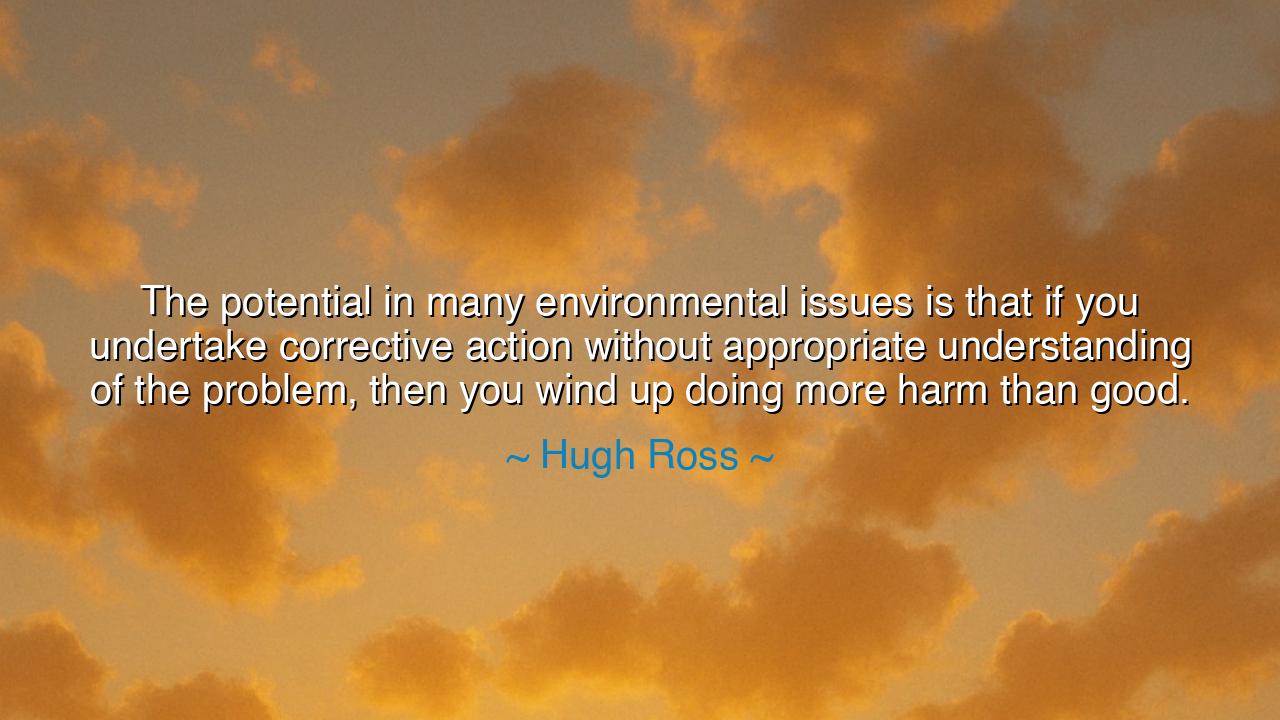
The potential in many environmental issues is that if you
The potential in many environmental issues is that if you undertake corrective action without appropriate understanding of the problem, then you wind up doing more harm than good.






When Hugh Ross declared, “The potential in many environmental issues is that if you undertake corrective action without appropriate understanding of the problem, then you wind up doing more harm than good,” he spoke with the voice of both scientist and sage. His words echo a truth that stretches through the centuries — that even the noblest intentions, when divorced from wisdom, can turn to ruin. In this reflection lies a lesson for every age: the world is not healed by impulse, but by insight; not by haste, but by harmony between knowledge and action.
Ross, an astrophysicist and Christian thinker, was no stranger to the complexity of creation. His understanding of the universe taught him humility before its design. In speaking of environmental issues, he cautioned against the arrogance of intervention — the human tendency to rush toward solutions before fully grasping the balance of the natural order. The Earth, he reminds us, is not a machine to be tinkered with, but a living system of immeasurable interdependence. To act without understanding is to strike at one thread in the web of life, not realizing that it trembles through all the rest.
History offers many tragic witnesses to this truth. In the 1950s, a noble effort was made to eradicate malaria by using the pesticide DDT. It was hailed as a triumph of human ingenuity — until the unintended consequences emerged. Birds of prey, poisoned by the accumulation of the chemical in their food chains, began to vanish. The air grew silent where eagles once soared. What was meant to preserve life had begun to destroy it. From this arose a deeper wisdom: that every action in nature carries ripples beyond our sight, and that understanding must precede intervention.
The ancients understood this balance in their bones. The Taoist sages of China spoke of wu wei — “right action through understanding,” or effort that flows with the nature of things. The Greek philosophers warned that hubris, the arrogance of presuming mastery over what one does not truly know, is the seed of tragedy. Even the healers of old would not touch a wound before discerning its cause, for they knew that to heal wrongly was worse than to leave it alone. In these echoes of old wisdom, Ross’s words find their ancestors — a lineage of humility before the mystery of creation.
To “do more harm than good” is not only a danger in science, but in all acts of moral zeal. The same error unfolds in politics, in religion, in personal life — wherever passion outruns wisdom. We see it when leaders impose policies meant to protect the poor that instead deepen poverty; when reforms for justice are built on emotion rather than evidence; when love itself turns suffocating because it seeks to control rather than to understand. Every noble heart must therefore learn the discipline of reflection before movement, of listening before speaking, of study before judgment.
The lesson in Ross’s warning is this: good intentions are not enough. The world is not healed by passion alone, but by wisdom born of patience. The Earth demands not saviors, but stewards — those who act with reverence for the delicate systems they touch. The wise do not rush to correct before they comprehend. They observe, they learn, they ask, and only then do they act. For knowledge without compassion is cold, but compassion without knowledge is blind.
And so, to all who labor for the healing of the world — scientists, activists, and ordinary souls alike — let this be your guiding light: seek understanding first. Study the soil before you plant. Know the river before you dam it. Listen to the wind before you harness its force. The world does not yield to good intentions, but it will open its secrets to those who approach with humility and awe.
For in truth, the greatest harm has always come from those who believed they knew enough. The greatest healing, from those who never ceased to learn. Hugh Ross reminds us that wisdom is the highest form of care, and that every action taken without understanding is a prayer unanswered, a cure that wounds. Let us therefore walk with both heart and mind — for only when love and knowledge move as one can we hope to mend the Earth, and ourselves, without doing more harm than good.






AAdministratorAdministrator
Welcome, honored guests. Please leave a comment, we will respond soon